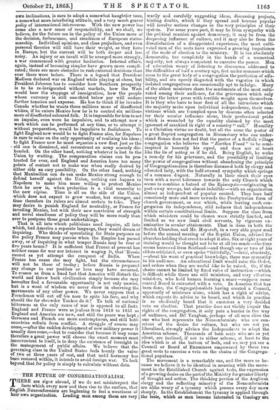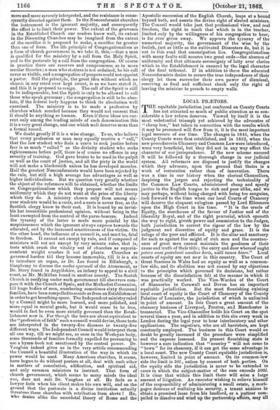'THE FUTURE OF - CONGREGATIONALISM.
THERE are signs abroad, if we do not misinterpret the i1 facts which every now and then rise to the surface, that English Nonconformists are beginning to feel a weariness of heir own organization. Leading men among them are very warily and carefully suggesting ideas, discussing projects, hinting doubts, which if they spread and become popular will involve serious changes in the very principles of their system. For some years past, it may be from sympathy with the political reaction against democracy, it may be from the deepening influence of culture, and it may also be from the dissatisfaction of a disappointed experience, the most culti- vated men of the sects have expressed a growing impatience of the mode of election to the ministry. It is too absolutely democratic, too completely in the hands of a numerical majority, not always competent to exercise the power. Men of education weary of listening to discourses addressed to the difficulties of half a century ago, fret under manners which seem to the great body of a congregation the perfection of affa- bility, and are openly disgusted with the vagaries in which isolated congregations are occasionally apt to indulge. Many of the ablest ministers share the sentiments of the most culti• vated among their audience, for the grievances which only annoy the latter press with terrible weight upon themselves. It is they who have to bear first of all the intrusions which the majority make upon individual independence, their con- victions which are trampled upon by deacons often selected for their secular influence alone, their professional pride which is wounded by the equality claimed by the most ignorant of mankind in right of a country " call." Humility is a Christian virtue no doubt, but all the same the pastor of a great Baptist congregation in Bloomsbury who can under- stand Renan does not feel that the pastor of a Suffolk village congregation who believes the "Earthen Vessel" to be semi- inspired is honestly his equal, and does not at heart like the lie of acting as if he did. Being English, he seeks a remedy for his grievance, and the possibility of limiting the power of congregations without abandoning the principle of Congregationalism is therefore discussed both by clergy and educated laity, with the half-avowed sympathy which springs of a common disgust. Naturally in their strait their eyes turn with a novel tolerance towards the only Church which seems to combine a hatred of the Episcopate—originating in past-away wrongs, but almost indelible—with an organization almost as independent of popular control. They lean half consciously more and more towards the Presbyterian form of church government, as one which, while leaving each con- gregation its independence, still reduces that independence within certain constitutional limits. Suppose the class from which ministers could be chosen were strictly limited, and limited as we now limit civil servants, by vigorous ex- amination in secular attainments. That is done in both the Scotch Churches, and Mr. Ilaycroft, in a very able paper read, before the annual meeting of the Baptist Union, advised the churches holding that creed to adopt it also. Six or eight years of training would he thought not to be at all too much—the time seems borrowed from Scotland—and though one or two of his elders criticized, or even spoke "faithfully,"—laice, abusively,.
—about his want of practical knowledge, there was sympathy in his audience. An educational limit would raise the Order,
and orders when they are useful like to be raised. Or, if the choice cannot be limited by fixed rules of instruction—which is difficult while there are still ministers, and very effective,
ministers, who hold human learning a snare—suppose some central Board is entrusted with a veto. In America that has been done, the Congregationalists having created a Council, apparently of ministers alone, which has a right of advice, which expects its advice to be heard, and which in practice is so obediently heard that it exercises a very decided veto on election. That practice does not visibly impair the rights of the congregation, it only puts a barrier in the way of unfitness, and Dr:* Vaughan, perhaps of all men alive the one who best represents the Nonconformists who are con-
scious of the desire for culture, but who are not yet liberalized, strongly advises the Independents to adopt the.
American scheme. Thousands of both seas who are as yet silent, are inclined, if not to either scheme, at least to the idea which is at the bottom of both, and we may yet see a, Council or Board of Examiners empowered by these two great sects to exercise a veto on the choice of the Congrega- tional populace. The movement is a remarkable one, and the more so be- cause we believe it to be identical in meaning with the move- ment in the Established Church against tests, the expression of a growing desire on the partof the Ministry for greater liberty of thought and action. The thinking portion of the Anglican,
clergy and the reflecting minority of the Nonconformists are alike weary of a tyranny which presses every day more sharply. Ia the Establishment the tyranny is applied through the tests, which as men become interested in theology are more and more severely interpreted, and the resistance is conse- quently directed against them. In the Nonconformist churches the instrument is the ignorant majority, and consequently the effort is to limit their power. The extent of the grievance in the Established Church our readers know well, its extent in the Dissenting Churches may be imagined from the extent of the sacrifice it is proposed to make, a sacrifice far greater than one of form. The life principle of Congregationalism as a form of church government is, we take it, this,—that a man is qualified for the ministry by a call from the Holy Spirit, and to the pastorate by a call from the congregation. Of course in practice there are reserves and compromises; as in more secular theories ; a man who stutters is not ordained, be his call never so visible, and a congregation of paupers could not appoint a pastor. Still the principle, the great idea without which no church in any creed ever kept sweet, is as we have stated it, and this it is proposed to resign. The call of the Spirit is still to be indispensable, but the Spirit is only to be allowed to call those who speak grammar ; the congregation is still to be abso- lute, if the federal body happens to think its absolutism well exercised. The ministry is to be made a profession by churches which seceded because they would not consent that it should be anything so human. Even if these ideas are cur- rent only among the leading minds of each denomination this it is a very great change, and one which well deserves more than a formal 'record.
We doubt greatly if it is a wise change. To us, who believe that every profession or man may equally receive a " call," that the law student who feels a crave to seek justice before fees is as much " called" as the divinity student who seeks righteousness before pelf, there is of course no offence in any severity of training. God gave brains to be used in the pulpit as well as the court of justice, and all the piety in the world will not make a blacksmith unless he has developed muscles. Half the greatest Nonconformists would have been rejected by the rule, but still a high average has advantages as well as higher individualism. But we question very greatly whether the object of the reformers will be obtained, whether the limits on Congregationalism which they propose will not secure uniformity which they do not want at the price of the liberty which they do. A ministry chosen only from among six- year students would be a caste, and a caste is never free, as the Scottish clergy know to their cost. It is bound by an invisi- ble but irresistible professional opinion, without being in the least exempted from the control of the purse-bearers. Indeed the tyranny of the latter is made more painful by the suspiciousness which the ignorant always express towards the educated, and by the increased sensitiveness of the victim. On the other hand, the influence of a council is, and must be, fatal to freedom. It cannot act except by rule, and if composed of ministers will not act except by very minute rules, that is, tests which crush the vitality out of churches as superin- cumbent weight crushes it out of plants. Churches so governed harden till they become immovable, till it is a sin to introduce an organ, as Dr. Lee found in Edinburgh, a blasphemy to discuss the modus operands' of the Atonement, as Dr. Story found in Argyllshire, an infamy to appeal to a civil court, as Mr. McMillan found in another county. The Scotch Church is ossifying under such government till observers com- pare it with the Church of Spain, and the Methodist Connexion, till huge bodies of men, numbering sometimes sixty thousand families, have been compelled to secede as from anEstablishment in orderto get breathing space. The Independent ministry ruled by a Council might be more learned, and more polished, and more equal in mental grade, but it would cease to be free, would in fact be even more strictly governed than the Estab- lishment now is. For though the tests are about equivalent to the "profession of faith" such a council would devise, those tests are interpreted in the twenty-five dioceses in. twenty-five different ways. The Independent Council would interpret them all one way, till we might see, as once in the Wesleyan body, some thousands of families formally expelled for presuming to use a hymn-book not sanctioned by the central power. Dr. Vaughan indeed gives us in the very article recommending the Council a beautiful illustration of the way in which its power would be used. Many American churches, it seems, have begun to do without pastors at all, deal with each other in matters of consolation, edification, and spiritual aid, and only summon ministers to instruct. That form of church government, which seems to many minds the ideal one, does not suit Dr. Vaughan at all. He feels as a lawyer feels when his client makes his own will, and on the ground that the pastorate is a divine institution actually threatens these churches with retribution from above I He, who denies alike the sacerdotal theory of Rome and the Apostolic succession of the English Church, leaps at a bound beyond both, and asserts the divine right of elected ministers. The Council would take just that professional view, and real freedom, the right to teach that which is in the teacher, limited only by the willingness of his congregation to hear, is for ever given away. We approve the tyranny of the numerical majority, the government of the wise by the foolish, just as little as the cultivated Dissenters do, but it is not in this road that emancipation lies. Congregationalism with many faults still secures two great ends—the absence of uniformity and that ultimate sovereignty of laity over clerics which in the Establishment is ensured by the legal character of the final tribunal. If in addition to these the educated Nonconformists desire to secure the true independence of their clergy let them surrender their own power of dismissal, reserving as final and sufficient check only the right of leaving the minister to preach to empty walls.































 Previous page
Previous page